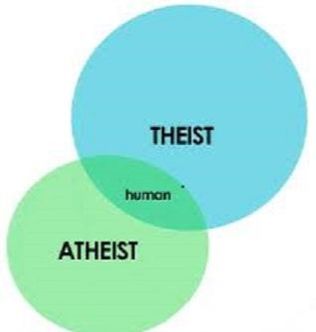
Galen, L.W. & Kloet, J.D. (2010). Mental well-being in the religious and the non-religious: evidence for a curvilinear relationship, Mental Health, Religion & Culture, 14(7), 673-689.
 Abstract: Previous studies demonstrating a positive relationship between religiosity and mental health have sampled from a highly religious general population with little differentiation between weak religiosity and non-religiosity. Church members are typically compared with non-religious unaffiliated individuals, thus confounding belief with group effects (e.g. social support). The present study examined mental well-being, utilising the full range of certainty of belief or non-belief in God. In the first study, we compared church and secular group members on measures of life satisfaction and emotional stability. The second study used a large survey of the non-religious. A curvilinear relationship was found such that those with higher belief certainty (both confidently religious and atheists) have greater well-being relative to those with low certainty (unsure and agnostics). Multiple regressions controlling for social and demographic variables reduced, but did not eliminate this curvilinear relationship. Mechanisms of well-being may involve a confident worldview rather than religious beliefs themselves. Galen, L.W. & Kloet, J.D. (2010). Mental well-being in the religious and the non-religious: evidence for a curvilinear relationship, Mental Health, Religion & Culture, 14(7), 673-689.
0 Comments
 Abstract: The Cognitive Science of Religion commonly advances the view that religious beliefs emerge naturally via specific cognitive biases without cultural influence. From this perspective comes the claim that self-proclaimed atheists harbor traces of supernatural thinking. By exploring the potential influence of the cultural learning mechanism Credibility Enhancing Displays (CREDs), which affirms beliefs, current disparities between studies involved in priming the implicit theism of atheists, might be reconciled. Eighty-eight university students were randomly assigned to either a religious or control prime condition. A dictator game was completed to obtain an indication of pro-social behavior (PSB). Lifetime theists reported significantly higher religious CREDs exposure levels than lifetime atheists, though not convert atheists. Conversely, lifetime atheists reported significantly lower CREDs exposure scores than convert atheists. Convert atheists in the prime condition were significantly more pro-social than lifetime atheists. Additionally, higher scores on the CREDs exposure measure equated to higher PSB in the religious condition than the control condition. The results are consistent with the view that supernatural belief formation is an interactive process between both context and content biases, and that in order to accurately test for implicit theism, past personal differences in exposure to religious CREDs should be considered. Hitzeman, C. & Wastell, C. (2017). Are Atheists Implicit Theists? Journal of Cognition and Culture, 17(1-2), 27-50  Abstract: Extensive research has been conducted in exploration of the American religious landscape; however, only recently has social science research started to explore nonbelief in any detail. Research on nonbelief has been limited as most research focuses on the popularity of the religious “nones” or the complexities of alternative faith expressions such as spirituality. Through two studies, one qualitative and one quantitative, this research explored how nonbelievers’ self-identify. Study 1 (the qualitative study) discovered that individuals have shared definitional agreement but use different words to describe different types of nonbelief. Through thematic coding, a typology of six different types of nonbelief was observed. Those are Academic Atheists, Activist Atheist/Agnostics, Seeker Agnostics, Antitheists, Non-Theists, and the Ritual Atheists. Study 2 explored the empirical aspects of these types related to the Big Five Domain, Ryff Psychological Well-Being, Narcissistic Personality Inventory, Multidimensional Anger Inventory, Rokeach Dogmatism Scale, and intersections related to religious and spiritual ontology Discussion: Overall these exploratory correlates of the typology suggest that personality measures have little correlation with varieties of nonbelief. Only the autonomy subscale of the Ryff measure differentiates between various groups in the typology but none of the other subscales reached our accepted level of significance. Likewise, the NEO subdomains offer little in ways of differentiating types with the exception of openness. More negative measures of personality such as Narcissistic Personality Inventory offers an exception where Anti-Theists (AT) appear to be more narcissistic than others, a finding that may suggest psychological issues involved in strong denial of theism associated with some of the “new atheism”. Other forms of nonbelief may not involve such strong personality involvement that tends towards the negative, a finding consistent with the fact that this group also scores higher on the Dogmatism Scale than any other group in our typology, as well as differing from the Intellectual Atheist/Agnostics (IAA) on the Multidimensional Anger Inventory. Thus, these correlational data are consistent with other empirical studies indicating little power for personality measures to predict either religion or personality. However, this is not to say that among one type, the Anti-Theists (AT), personality measures suggestive of closed-mindedness as a defense against anger might not be fruitful avenues to explore. However, it is also true that these negative characteristics are not characteristic of the variety of atheists in our typology and remain in this limited sense, an exception. Just as many scholars have stated that there is no such thing as “religion” in general we put forth that there is also no such thing as “atheism” or “nonreligion” in general – nonreligiosity varies because secular identity and activity is quite multidimensional. More specifically, nonbelieving peoples show great psychological variation in their makeup. Researchers can no longer operate as though a unified psychological profile of “atheists” exist. Past psychological profiles that treat “atheism” as a single entity should be revisited in light of the data presented here. Silvera, C.F., Thomas J. Coleman III, T.J., Hood, R.W. & Holcombec, J.M. (2014). The six types of nonbelief: a qualitative and quantitative study of type and narrative. Mental Health, Religion & Culture, 17(10), 990–1000 |
Categories
All
Archives
December 2018
|
IRONSTRIKES |
Men Forging Men |